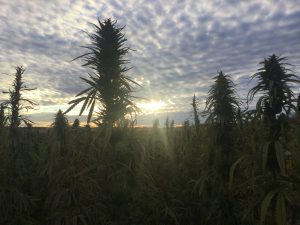
(This is the last installment in a five-part series examining the shortage of feminized hempseeds and clones and its effects on the hemp industry. To read the previous installments, click here.)
The breeding of hemp varieties is ramping up among plant breeders and at hemp farms with established research-and-development departments.
In more humid areas of the United States, farmers have had difficulty working with hemp varieties that were bred for arid climates. Most varieties on the market are acclimated to hot, dry conditions.
But with short growing seasons and colder climates in Northern states and longer seasons in Southern states – not to mention states where growers hope to achieve more than one crop turn – more genetic options are needed to accommodate farmers’ production goals.
This groundbreaking move for the nascent industry offers protection for seed-propagated hemp genetics through the U.S. Plant Variety Protection Act, a law that gives breeders exclusive control over seed- and tuber-propagated varieties.
Hemp Industry Daily asked hemp experts about their hemp-breeding efforts to provide more genetics to the marketplace.
Has your company been developing new genetics for different regions of the U.S.? What kind of demand are you seeing for these new varieties? Will you apply for plant variety protection through the USDA? Why or why not?
 Eric Mathur, chief science officer, Tilt Holdings, Canada
Eric Mathur, chief science officer, Tilt Holdings, Canada
The strategy we employ involves multiple cycles of inbreeding our top-performing cultivars followed by quantitative phenotypic selections during large-scale performance trials.
This process generates (almost identical) parental lines. … The cultivars purified through these iterative cycles of inbreeding and selection are then subjected to (gene-mixing) crosses … to produce true cannabis and hemp F1 hybrid seed.
The hybrid seed will produce uniform plants, with predetermined agronomic requirements and defined chemical profiles with performance characteristics optimized for the specific grow environment.
 Steven Turetsky, managing director, Shi Farms, Colorado
Steven Turetsky, managing director, Shi Farms, Colorado
Once we’ve developed novel, proprietary varieties, we will definitely look into that.
The other thing we’ve seen this year is the use of material transfer agreements, so basically telling your client and hoping that they operate the same, that they’re not going to use your genetics.
If you have created something special, then they give you a material-transfer agreement. You’re agreeing that you’re not going to use their genetics for anything other than production.
That’s been a regulatory practice people are putting out there, which I think is great because people have to feel protected in order to sell varieties and get the market high-quality plants.
 Tim Gordon, CEO, Functional Remedies, Colorado
Tim Gordon, CEO, Functional Remedies, Colorado
We have developed genetics for our needs that perform optimally.
We have applied for plant protection, as these genetics are specific to Functional Remedies.
 Alex Seleznov, CEO, Advanced Extraction, Colorado
Alex Seleznov, CEO, Advanced Extraction, Colorado
Our company has several genetic development efforts in place. We are not offering these new genetics for general sale, but only to strategic growing partners (with) which we accumulate data and biomass.
We will be seeking plant variety protection of efforts that produce results substantiating such protections.
At this time, specific region differentiation is not our top priority. We are most interested in increasing the ratio of CBD to THC in the plant, increasing yield and durability, as well as strengthening general pest, disease and resistance issues that most impact a grower’s crop.
 Chris Boucher, CEO, Farmtiva, California
Chris Boucher, CEO, Farmtiva, California
Yes, we have developed and acclimated several varieties for the past two years under our established research program.
One of our most desired cultivars we have bred is our Auto Flower Wine. We will be able to grow and distribute these for Florida, Texas and some other lower states.
 Cory Sharp, CEO, HempLogic, Washington state
Cory Sharp, CEO, HempLogic, Washington state
All the other cannabinoids besides CBD will be the near future before the bottom of this gold rush is over: CBN, CBG, etc.
We have some cool things in the works for next year. Our customers that pay us to grow demand it.
Interviews have been edited for length and clarity.
Laura Drotleff can be reached at [email protected]

